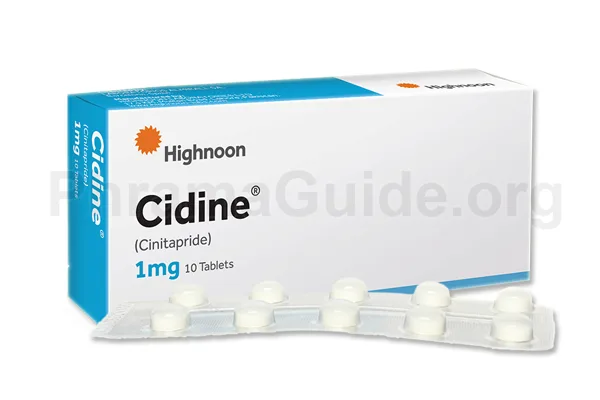Cidine tablet is a medication that is primarily used to treat gastrointestinal motility disorders. It acts as a prokinetic agent, meaning it helps to enhance the movement and coordination of the gastrointestinal tract. Following are some common uses of Cidine tablets:
- Gastroesophageal Reflux Disease (GERD): Cidine tablet is commonly used for the treatment of GERD, a condition in which stomach acid flows back into the esophagus, causing symptoms like heartburn, regurgitation, and chest pain. It helps to reduce the frequency and severity of reflux episodes by improving the movement of the lower esophageal sphincter and enhancing esophageal clearance.
- Dyspepsia: Cidine tablet is also used to alleviate symptoms of dyspepsia, which include pain or discomfort in the upper abdomen, bloating, and early satiety. It improves gastric emptying and enhances the coordination of stomach contractions, leading to improved digestion and relief from dyspeptic symptoms.
- Gastroparesis: Cidine tablet is used to help improve gastric emptying and relieve the associated symptoms in patients with gastroparesis. A condition characterized by delayed gastric emptying, which can cause symptoms such as nausea, vomiting, early satiety, and bloating.
- Functional Gastrointestinal Disorders: Cidine tablet may be used in the treatment of various functional gastrointestinal disorders, including irritable bowel syndrome (IBS) and functional dyspepsia. It helps to normalize gut motility and reduce symptoms such as abdominal pain, bloating, and altered bowel habits.
Off-label Uses of Cidine Tablet
- Postoperative Ileus: Postoperative ileus refers to the temporary impairment of normal bowel motility following abdominal surgery. Cidine may be used off-label to enhance gastrointestinal motility and shorten the duration of postoperative ileus.
- Chemotherapy-induced Nausea and Vomiting (CINV): Cidine tablets can used to reduce nausea and vomiting associated with chemotherapy. While not approved specifically for this indication, it may be used off-label in some cases to manage CINV, particularly when other antiemetic medications are ineffective or not well-tolerated.

What is Cidine?
Cidine is one of the leading brands of Cinitapride, manufactured and marketed by Highnoon Laboratories Ltd, Pakistan.
Cidine Alternatives : Other Similar Brands
The following are some alternative brands of Cidine and their manufacturers.
- Cinita : Getz Pharmaceuticals (Pvt) Ltd, Pakistan.
- Cinirant : Amarant Pharmaceuticals (Pvt) Ltd, Pakistan.
- Cinride : Genix Pharmaceuticals (Pvt) Ltd, Pakistan.
- Rogastril : Genome Pharmaceuticals (Pvt) Ltd, Pakistan.
Cidine : Available Formulations and Strengths
Presently, Cidine is available in Tablet and Syrup Forms with the following strengths.
Cidine Tablets : 1mg strength.
Cidine Syrup : 1mg strength.
Who Should Not Use Cidine?
Cidine has contraindications, which are specific conditions or situations in which the use of Cidine is not recommended due to potential risks or adverse effects.
- Hypersensitivity or allergy: Cidine is contraindicated in individuals who have a known hypersensitivity or allergy to Cidine or any of its components. Allergic reactions can range from mild skin rash to severe anaphylaxis, which is a life-threatening allergic reaction.
- Gastrointestinal obstruction or perforation: Cidine is contraindicated in individuals with a known or suspected gastrointestinal obstruction or perforation. It can potentially worsen the condition or delay appropriate medical intervention.
- Gastrointestinal bleeding: Cidine should not be used in individuals with active gastrointestinal bleeding or a history of gastrointestinal bleeding. It may increase the risk of bleeding or interfere with the diagnosis of the underlying cause of bleeding.
- Parkinson’s disease: Cidine is contraindicated in individuals with Parkinson’s disease or Parkinsonian symptoms. It may exacerbate these conditions due to its effects on dopamine receptors.
- Severe liver impairment: Cidine should be used with caution or avoided in individuals with severe liver impairment. It is primarily metabolized in the liver, and impaired liver function may affect the metabolism and clearance of the medication.
- Pregnancy and breastfeeding: The safety of Cidine use during pregnancy or breastfeeding has not been adequately studied. It is generally recommended to avoid using Cidine in these situations unless the potential benefits outweigh the risks. Healthcare professionals should be consulted for appropriate guidance.
What is the Recommended Daily Dosage of Cidine?
Cidine Dose for adults and adolescents (usually 12 years and older):
- 1 to 3 tablets of 1mg, two times a day.
- The total daily dose should not exceed 6mg.
Cidine Dose for For children (under 12 years of age):
- Dosage recommendations for children should be determined by a pediatrician or healthcare professional based on the child’s age, weight, and the specific condition being treated.
How Cidine Works?
Cidine mode of action involves multiple mechanisms, including the following:
- 5-HT4 receptor agonism: Cidine selectively stimulates the 5-HT4 (serotonin) receptors located on the smooth muscle cells of the gastrointestinal tract. Activation of these receptors promotes the release of acetylcholine, which enhances peristalsis (the coordinated contractions that propel food through the digestive system). Increased acetylcholine release leads to increased muscle contractions and improved motility.
- Dopamine D2 receptor antagonism: Cidine also exhibits antagonist activity at dopamine D2 receptors. By blocking these receptors, it reduces the inhibitory effects of dopamine on gastrointestinal motility. Dopamine normally acts to inhibit the release of acetylcholine, so by antagonizing dopamine receptors, Cidine indirectly increases acetylcholine release and enhances gastrointestinal motility.

Leave A Comment